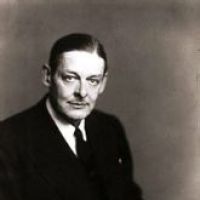艾略特的爱情歌曲《阿尔弗雷德·普鲁弗洛克的情歌》
Paper代写范文:“艾略特的爱情歌曲《阿尔弗雷德·普鲁弗洛克的情歌》”,这篇论文主要描述的是艾略特的《阿尔弗雷德·普鲁弗洛克的情歌》是一首非常经典的爱情歌曲,在这首情歌当中用歌词描述出其对于一辈子的感叹,用一个老人的回忆来勾画出以往的事情,以及生活中所充斥满的那种寂寞。

The Love Song is the lifetime of laments that one old-aged man remembers, which consist of his past failures. He then puts them into the context of his now-meaningless life to try to comprehend the significance and compensate for his loneliness. Through Eliot's rich imagery and excellent use of Poetic Language, Prufrock's explanation of his memories, his experiences and most importantly, his feelings (most of which are doubt) come alive in this poem.
Prufrock's dichotomy lies in not only his fear of socilisation but also the underlying misconception that he can change the SORDID State his life is in. On the one hand, Prufrock says "And indeed there will be time...yet for a hundred indecisions and for a hundred visions and revisions..."meaning that he is under the impression that he still has a chance to make his life the way it was in his dreams. The unfinished statement "I am Lazarus, come from the dead/ come back to tell you all, I shall tell you all-..." explains this. Some of his dreams/"illusions of grandeur"(Solo, 104) are of the sort that contain "arms that are braceleted and white and bare..." (women) while others are the more general type, just simple wishes to belong to the modern society "I have known the eyes already, known them all: --..." The other hand, the one that drags him back to reality and his current state of solitude also reflects his self-consciousness and the "dark[er] side" ( Vader, 226) of his fear to become successful in life with the possibilities of failure looming in the background, such that his life has little time left "I have seen the eternal Footman hold my coat, and snicker/ And in short, I was afraid." Prufrock is also afraid of the confrontation between himself and others, mostly women which, ironically, he is in constant pursuit of ("do I dare? Do I dare?")
The formulaic use of irony and imagery are prevalent throughout the poem, as well as the Lesser symbolism to Pass (the Eliot) convey Prufrock's point of view but moreover, his way of thinking. When he speaks of his "head upon a platter" he is juxtaposing himself to John the Baptist, almost in a pathetic manner. The imagery is not as literal as it tends to be, but it is more of the lyrical, supernatural descriptions that set the mood for this poem. Eliot speaks of "yellow fog" rubbing the windowpanes and smoking pipes and narrow streets at dusk. This characteristic is purely modernistic, as is the irony. Prufrock's major irony is the misconception that he can change that he is hopeful but his life is so short (after all, he measures his life in coffee spoons!) and he would never be brave enough if he was given the time anyway! Wow! What a thrill! This poem is super-dee-duper. I have spotty underpants nein nein nein nein nein
The rhythm is on a somewhat lilted and distorted elementary-ish rhyme scheme. Although most modern poems do not obey the strict laws of composition (sonnets for example and more non-British, "Haiku" (Urisetsuu, 240 A.D), this one loosely follows typical poetic rhyming schemes but with a complex modern 20th Century "twist [and shout]" (Lennon, 1964). The fourth stanza's structure is as follows (with the last words being rhymed only.): peacefully, fingers. Malingers, me. Ices, crisis,{end first sub-stanza} prayed, platter, matter, flicker, snicker, afraid. The first and last word of each sub-stanza rhyme and the couplets in the middle create a tone for the poem that sets it as a true Love song. There are also refrains, or choruses and couplets that repeat themselves.
Connotation in this poem is mainly of the themes of death and night towards the end of the poem (symbolism in itself)! Near the beginning, Eliot fills almost every line with the imagery and depth that somehow becomes less prevalent as the poem progresses. The connotation of his chorus "In the room the women come and go, talking of Michaelmalangelo (Homer, 1221) could represent the repetition of the high society's lifestyle of which he is not a member. This is also his lamentable reply. The dryyyyy cracker.
These elements amalgamate with Eliot's excellent ability to simply explain a complex and underwritten subject.
51due留学教育原创版权郑重声明:原创留学生作业代写范文源自编辑创作,未经官方许可,网站谢绝转载。对于侵权行为,未经同意的情况下,51Due有权追究法律责任。
51due为留学生提供最好的processing代写服务,亲们可以进入主页了解和获取更多paper代写范文 提供最专业的美国作业代写,详情可以咨询我们